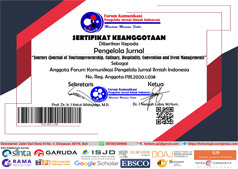Sustainable Gastronomy Practices In Indonesia’s Island Tourism: A Focus On Bali And Labuan Bajo
Abstract
Sustainable tourism, according to the United Nations Environment Program and the World Tourism Organization, involves developing tourism that considers economic, social, and also environmental impacts, ensuring the benefits for current and future generations. The 2 iconic islands destination in Indonesia, Bali and Labuan Bajo, has offered distinctive opportunities in implementing sustainable tourism practices through their specialty beverage products. The study aims to explore how the traditional practices and natural resources in these islands contribute to sustainable tourism development. Labuan Bajo highlights Sopi wine, a distilled beverage from the plants of lontar palm which are deeply rooted in cultural heritage and community livelihoods. Whereas in Bali, a well know herbal drink called Loloh Cemcem sourced from Penglipuran Village, showcasing the commitment to cultural preservation and sustainable resource use. This research employs a qualitative approach, combining descriptive analysis and focus group discussions. The results reveal that both islands make good use of their geographic and cultural contexts to develop sustainable specialty products, enhancing tourism appeal, supporting local economic, and ensuring long-term resource viability.
Copyright (c) 2024 Sandy Dwiputra Yubianto, Aditya Nova Putra

This work is licensed under a Creative Commons Attribution 4.0 International License.
















